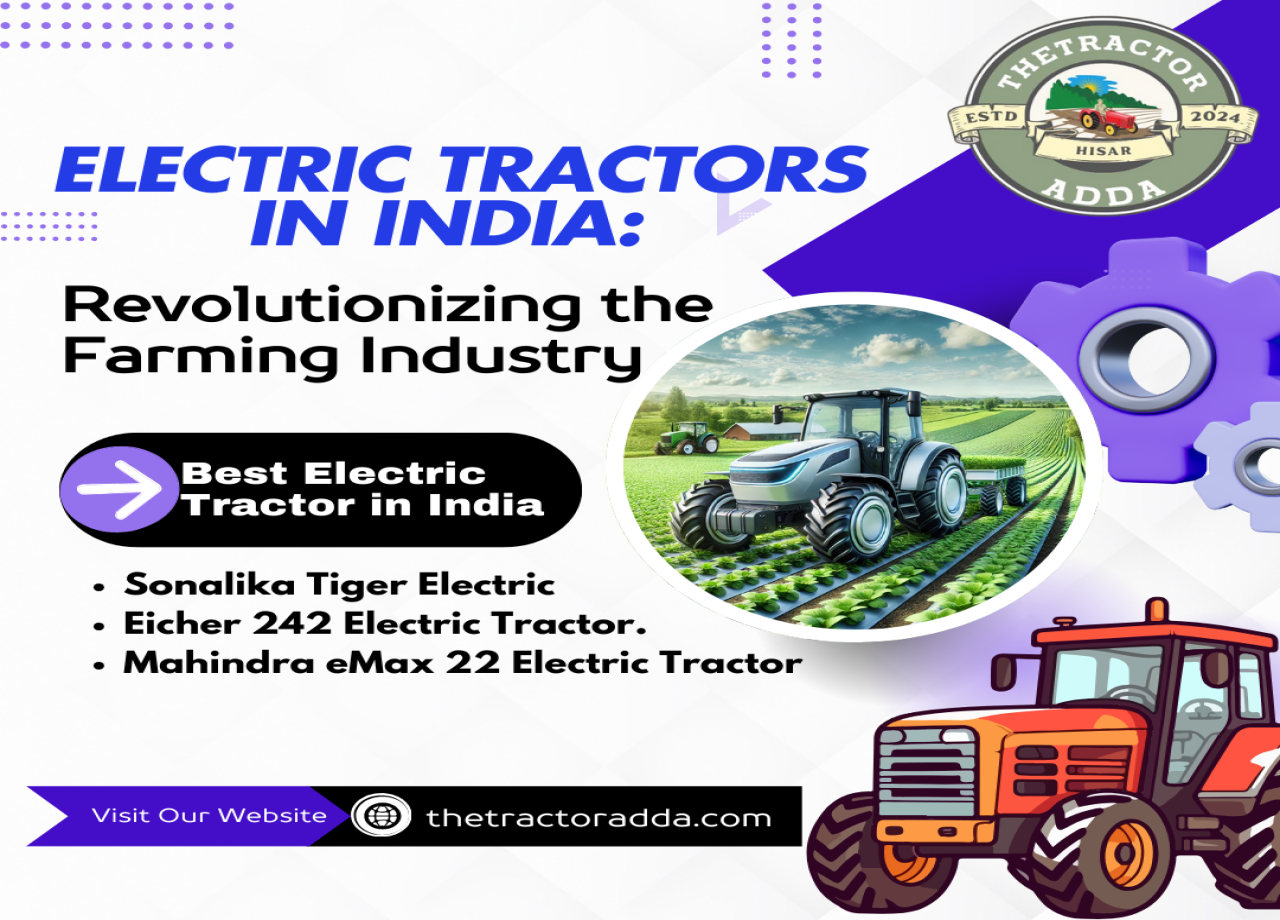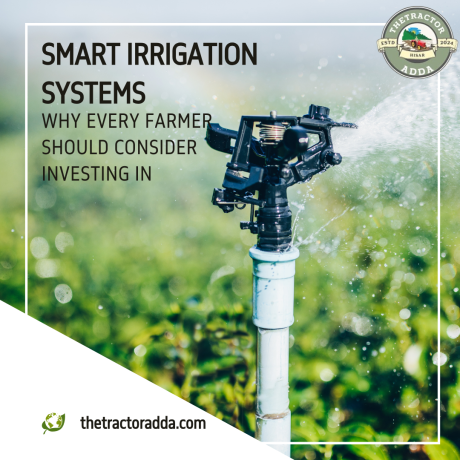Electric Tractors in India: Revolutionizing the Farming Industry | TheTractorAdda

Blog Description
Electric Tractors in India: Revolutionizing the Farming Industry
The agricultural sector is evolving rapidly, and one of the most exciting innovations in recent years is the introduction of electric tractors in India. These advanced farming machines offer an eco-friendly, cost-effective, and technologically superior alternative to traditional petrol and diesel tractors. As farmers in India continue to seek better solutions for efficient farming, electric tractors are emerging as a game-changer, offering many benefits that align with the growing demand for sustainable and smart agriculture.
Best Electric Tractors in India
India’s electric tractor market is still in its infancy, but several brands have already made significant strides with advanced electric farming solutions. Here are some of the best electric tractors that have gained popularity in India:
- Sonalika Tiger Electric
- Known for its robust build and high performance, the Sonalika Tiger Electric offers a powerful solution for medium to large-scale farms. With a 25-30 hp range, it provides farmers with impressive torque and excellent power output while being environmentally friendly.
- Eicher 242 Electric Tractor
- A leader in the electric tractor space, the Eicher 242 is an affordable and efficient option. Its eco-friendly nature and zero emissions make it ideal for small-scale farming. The electric model ensures a quieter and smoother farming experience with less maintenance cost.
- Mahindra eMax 22 Electric Tractor
- Mahindra is a trusted name in the Indian tractor industry, and its electric version doesn’t disappoint. The eMax 22 electric tractor offers a blend of superior technology, power, and affordability. With its innovative features and ease of use, it is a perfect fit for small and medium-sized farms.
Electric Tractors vs. Petrol/Diesel Tractors: A Comparison
When comparing electric tractors to traditional petrol and diesel tractors, the differences are clear. Below is a comparison of both in various aspects:
1. Cost of Operation:
- Electric Tractors: They are more cost-effective in the long run. Charging the tractor with electricity is cheaper than refueling a petrol or diesel tractor. Additionally, electric tractors require less maintenance due to fewer moving parts.
- Petrol/Diesel Tractors: These tractors incur higher fuel costs, which can add up over time. Additionally, they require more frequent servicing and maintenance due to engine wear and tear.
2. Environmental Impact:
- Electric Tractors: These tractors are eco-friendly as they produce zero emissions. They contribute to reducing pollution and greenhouse gas emissions, which is crucial for sustainable farming practices.
- Petrol/Diesel Tractors: Traditional tractors emit harmful gases like CO2 and NOx, which contribute to air pollution and climate change.
3. Noise Levels:
- Electric Tractors: Electric tractors operate quietly, reducing noise pollution on farms. This is especially beneficial in noise-sensitive areas and for the well-being of workers.
- Petrol/Diesel Tractors: These tractors are noisy and create a disruptive work environment, which can be stressful for workers and animals on the farm.
4. Maintenance and Durability:
- Electric Tractors: With fewer moving parts and no internal combustion engines, electric tractors have lower maintenance costs and longer lifespans. They require only periodic checks for their electrical systems and battery.
- Petrol/Diesel Tractors: These tractors need regular maintenance, such as oil changes and exhaust system checks. They are also more prone to breakdowns due to the complexity of the engine.
5. Performance:
- Electric Tractors: Electric tractors offer instant torque, which ensures smoother operations and better handling, especially in low-speed applications. However, their power and lifting capacity are generally lower compared to petrol/diesel tractors.
- Petrol/Diesel Tractors: Known for their power and versatility, diesel tractors can handle heavy-duty farming tasks like plowing and hauling large equipment. They excel in high-speed applications and rough terrains.
Technology Behind Electric Tractors
The technology powering electric tractors is constantly evolving, and brands like Mahindra, Sonalika, and Eicher are incorporating cutting-edge innovations in their models. Here’s a look at the key technologies:
- Battery Technology:
- Electric tractors use high-capacity lithium-ion batteries that provide longer run times and faster charging capabilities. These batteries are designed for longevity, durability, and high energy efficiency.
- Regenerative Braking:
- Many electric tractors are equipped with regenerative braking systems. This system captures energy during braking and redirects it to recharge the battery, enhancing overall efficiency and range.
- Telematics and IoT:
- Advanced electric tractors come with telematics and IoT integration, allowing farmers to monitor their tractors remotely. These systems provide data on battery health, fuel efficiency, and performance, helping farmers optimize their operations.
- Electric Motor:
- Electric tractors feature powerful electric motors that provide higher torque without the need for a traditional gearbox. This results in smoother acceleration and improved performance on various terrains.
Growth Of Electric Tactors In India
The growth of electric tractors in India is gaining momentum as the agricultural sector embraces eco-friendly and cost-effective solutions. As the world moves toward sustainability, India’s farming industry is undergoing a transformation, with electric tractors becoming a game-changer for both small and large-scale farmers.
Rising Demand for Sustainable Farming Solutions
India's agricultural sector has long relied on traditional petrol and diesel tractors, but the growing concerns over pollution, rising fuel costs, and the need for environmentally-friendly farming practices have paved the way for electric alternatives. Electric tractors, with their low emissions and efficient energy use, are becoming an attractive option for farmers seeking to reduce their carbon footprint and operational costs.
Government Support and Incentives
The Indian government is playing a key role in encouraging the adoption of electric vehicles (EVs), including electric tractors. With initiatives like subsidies, incentives, and tax benefits for electric vehicles, the government is making it easier for farmers to make the switch to electric-powered farming solutions. This, coupled with the push for green energy, is accelerating the growth of the electric tractor market.
Technological Advancements Driving Growth
Electric tractors in India are powered by cutting-edge battery technology and advanced electric motors, ensuring longer battery life, faster charging times, and reliable performance. Many electric tractors now feature regenerative braking, telemetry systems, and smart farm management solutions, making them more efficient and user-friendly. These technological advancements are a major reason why farmers are embracing electric tractors to improve their productivity and reduce long-term costs.



